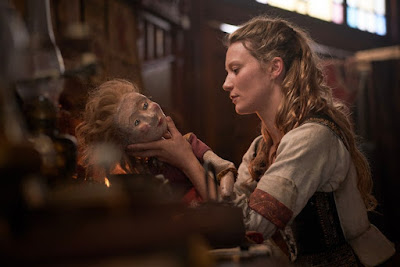If you take almost any folk tale or traditional entertainment and think of it happening in real life you never have to delve deep to find its horror. While some form of Cindarella or Snow White might well be told today it's hard to imagine anyone getting away with a Punch and Judy puppet show now without exhaustive surgical remodelling. The link to domestic violence is not even allegorical, it's just there in the action. The closer you get between the violence of an old story and its surface the deeper you are going to have to think about how you do it if you are going to render it as more or less recognisable drama. This is pretty much why magical realism exists, that dark ferry ride between the realm of the impossible and the face-slapping other one we know from every day of our lives. So, if you use Punch and Judy in a fiction you are going to need a firm hand at the helm.
Punch and Judy are a theatrical duo who perform a well loved marionette show in a rowdy medieval mishmash of an inland town called Seaside. Punch has a problem with alcohol and, while initially seems a loving husband and father, can turn darkly narcissistic with a drop or two. It might well explain why, as Judy observes, the show is getting more violent. He pleads public appeal but we already know better.
The basic set up of a Punch and Judy show is that the short tempered and violent Punch is left with responsibilities he can't handle and disaster ensues for which he is punished despite a self-defence riddled with lies. This forms the climax of the first act and in a test for the production, we are shown what happens when this flesh and blood Punch does when asked to mind the baby and do some other chores. We are taken so close to horror in this sequence that it elicits the same response to children watching a puppet version on a seaside holiday, we gasp or just hold our breath with popping eyes. And then it gets worse.
Act two changes pace as it might but, even though it does introduce some engaging elements and some strong filmmaking, begins to drag when it ought to start tightening and accelerating. Punch tries to make do with what's left of his life to build another like it as Judy slowly returns to life in a kind of fairyland bootcamp peopled by women who describe themselves as heretics. We have already seen what the folk of Seaside do with anyone accused of difference in an early stoning scene that is not played for laughs.
The problem which will plague this film until its coda is one of pacing. When we need the conflict and action of the third act we get exploration of themes we are already familiar with. The climactic action is passably carried off but is allowed to slow down too much to regain momentum. As said, there is a coda and it is effectively creepy.
What brings us repeatedly back to focus through these lapses is performance. Everyone's go-to Charles Manson Damon Herriman (that needs to change) gives us a complex monster in Punch. An early shot of him looking at his own reflection after being chided for his drinking shows someone who doesn't like what he sees but later, darkly sophisticated by his own extremity, it's an affimation of his talent at facade. The puppet Punch is a trickster, even cheating the hangman, using charm and guile in the path to violence. Not one or the other but both. Herriman's Punch knows his failings but also the delicate balance of public opinion. His initial capacity for love colours his quickly rising brutality with horror. Mia Wasikowska finds the gravity under Judy's initial complanency to emerge as credibly vengeful. It is a nuanced and tough performance.
The trailer for this film plays up the lighter ironical moments that might suggest a contemporary Princess Bride but the gravity sets in early and, while there are a few Pythonesque gags here and there they are not allowed too much weight. The setting might as well be anywhere but, puzzlingly, there are references to London and Wales in the dialogue and the accents for this landlocked village are character-based (Cockneys for common folk, Irish for the showbiz title characters, Scottish brogues for the tugs etc.) all of which contribute to the tension between pantomime and drama that must be kept taut throughout.
While this doesn't always work I'm going to give it credit for its commitment. In times of revised public figures, the Roman Polanskis, Woody Allens or Michael Jacksons, a public repentance with a sorry-not-sorry tone sounds, appropriately like a sports figure trying to get past a difficult public faux pas. With the horrifying figures on domestic violence nationwide there is no better time to haul such a story from the puppet booth into live action cinema, especially with a plea to consider its victims and survivors over the power of its perpetrators. And then, crucially, how airing the issue in public life in a fictive medium can have a double edge. This film's coda includes itself in this equation. Now that's commitment!

No comments:
Post a Comment